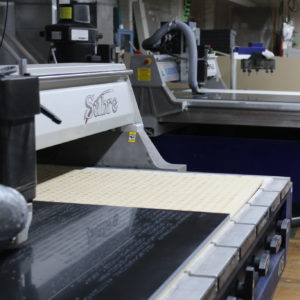 Modern CNC machining services enhance production automation for a wide range of high-value parts on a mass scale. CNC, the acronym for computer numerical control, is a digital manufacturing technology that combines computerized controls with machine tools. The technology effectively removes or subtracts selected material from a blank workpiece with efficiency, precision, and high repeatability. The result enables mass production of custom-designed parts and components vital in manufacturing goods and products for consumers.
Modern CNC machining services enhance production automation for a wide range of high-value parts on a mass scale. CNC, the acronym for computer numerical control, is a digital manufacturing technology that combines computerized controls with machine tools. The technology effectively removes or subtracts selected material from a blank workpiece with efficiency, precision, and high repeatability. The result enables mass production of custom-designed parts and components vital in manufacturing goods and products for consumers.
Due to its enhanced production value, CNC machining is the most common subtractive manufacturing process used by industries today. The technology allows engineers, designers, and fabricators to perform and create intricate geometries from stock raw material through programmed instruction of computer-aided design (CAD) files. In short, CNC machining uses computer-driven machine tools to produce a part out of a variety of materials into different forms and shapes. Enhanced production is achieved through automation, which permits autonomous operation by a CNC machine. Once the machine has been programmed it can perform machining tasks with the tools it is fitted with. It is an important distinction to keep in mind. CNC machining is the process accomplished with a programmable CNC machine.
Parts and components can be derived from numerous materials, from plastics, wood, composites to metals, foam, glass, fiberglass, and much more. CNC machining applications serve commercial and defense-related industries. Parts and components for automotive, aerospace, lighting, medical, cryogenics, devices for military applications, HVAC systems—furnaces, refrigeration and AC, high tech and electronics, solar, hot water heaters, and textile are just some of the industries that rely on the production made possible by CNC machining.
With advances in modern digital manufacturing technology and automation, CNC machining can rapidly produce higher quantities of parts with high precision and accuracy. Producing unique prototypes to production runs large, medium, or small. CNC machining offers an efficient, cost-effective way for industries to produce more complex parts in less time for lower costs.
Today’s CNC machines still perform the traditional subtractive manufacturing processes such as drilling, routing, milling, and engraving; however, these methods are greatly enhanced by digital manufacturing technology. Modern, multi-axis machining capabilities can create incredibly intricate, complex geometries once thought impossible. Custom CAD models easily convert into files, control CNC machine processes, and manipulate tools on many axes that comply with the computer program’s pre-coded instructions. Parts are produced with precision and complexity for custom assemblies by manufacturers.
The enhanced production automation that CNC machining services are capable of producing not only provides a wide range of high-value parts but scales manufacturing as needed to make higher quality parts with greater accuracy. Digital manufacturing technology has substantially reduced if not eliminated the need for manual intervention during most manufacturing processes. As programming controls machine tools’ operation, the most obvious result is the increases in productivity that automation provides.
But there is more. CNC machining technology also ensures the necessary consistency and uniformity in the creation of custom parts. Once the design parameters have been entered into the machining software, each component will match the prototype to exact specifications. The program efficiently produces the design with high repeatability, executing commands to accommodate flexible production runs to scale as needed.
As a digital manufacturing technology, CNC machining enhances production automation for a wide range of high-value parts on a mass scale. The technology offers the design and execution of complex geometries once unheard of, improving the quality, precision, accuracy, and consistency in the fabrication of parts and components. The added flexibility in production runs for manufacturers to stay competitive.
